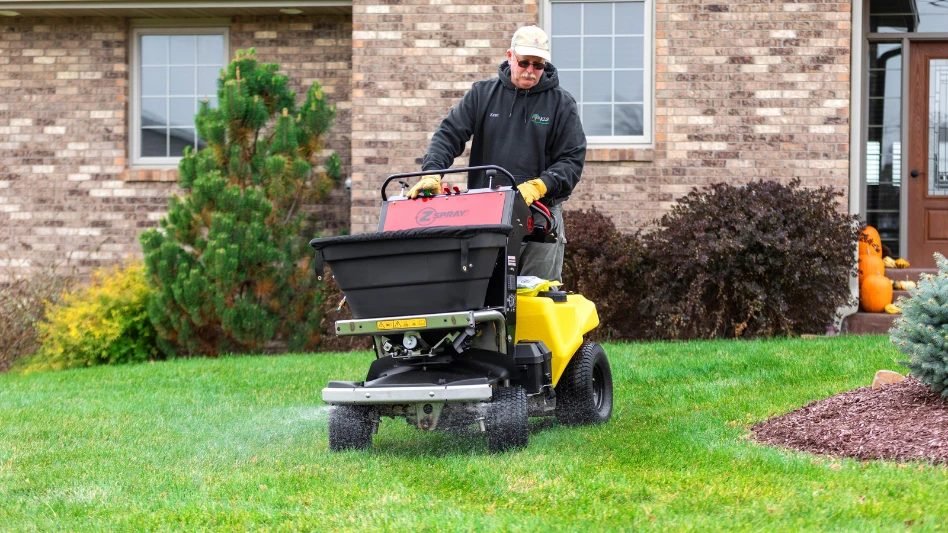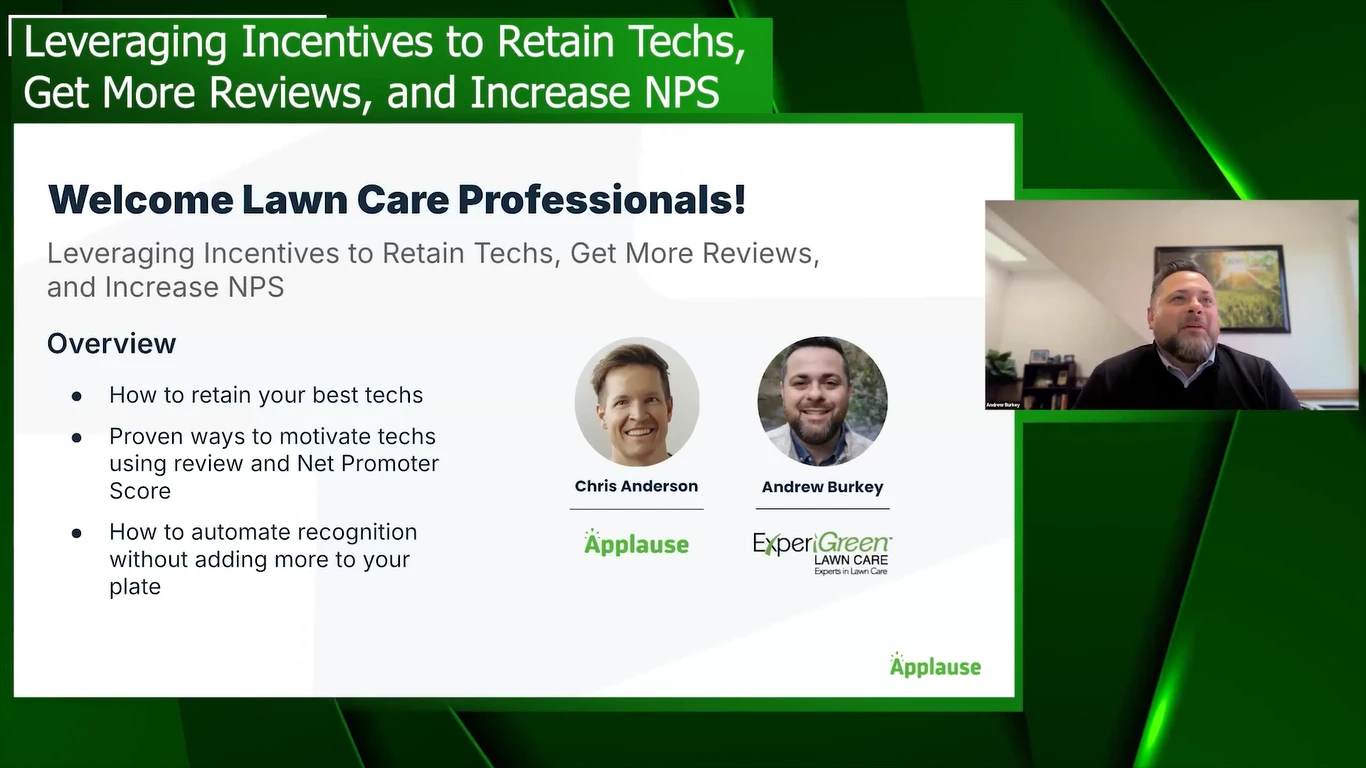
David Patton believes his company, Pure Turf, is winning by “building through the draft.”
It’s an apt catchphrase for the former collegiate baseball player. He’s still an avid golfer and enjoys watching college football on his fall weekends. It’s a saying that’s helped Pure Turf in Nashville jump nearly 111% in revenue in just three years. Pure Turf’s emphasis on finding the right employees to drive the company has also bolstered its revenue to $3.4 million.
The company’s now up to 15 employees, but the growth might not have happened had Patton whiffed on one of his biggest recruits.
Three years ago, Patton invited Ronnie Bone to join him for lunch at a nearby private country club. Pure Turf had just had its first $1 million year, and Patton felt his company was building serious momentum. But he was missing a key player on his team — someone who could manage daily responsibilities so Patton could focus on the bigger picture growth.
Across the lunch table, Bone wondered how he could sit at tables like this all the time. Peering up from his blackened salmon and kale salad, Bone took in the striking view of the 18th hole on the club’s course. “(I remember thinking) this is a different world,” Bone says. “There’s guys in there you want to be around.”
Bone also remembers how the room hummed with a certain energy of success. Yes, it’d be a bold career choice to leave his job at another landscaping company for Pure Turf. But it felt right to talk big picture goals with Patton. These were the people Bone wanted to know. So, when Patton followed up with an official job offer, Bone made his decision quickly.
He said no.
“I was not happy,” Patton laughs now. “I wasn’t going to take no from him because I knew he was who we needed.” Bone had replied to Patton’s job offer email with another email, and Patton replied feverishly. “You can say no,” Patton remembers writing, “but you have to come to my house and tell it to my face.”
After some more deliberating, Bone showed up on Patton’s doorstep and asked when he’d start.
“I had slept on it; I had thought on it. It was a big career change,” Bone says, admitting that he didn’t want to put his budding family in a tight financial spot by leaving his post at the other company. But everything Patton had said felt right. “From that day forward, it’s been go time,” he says. “I wake up energized.”
Bone and Patton both believe they’ve created this energetic vibe by building a level of professionalism unseen from other landscaping companies and scouting out the right employees.
“Looking back, when I started… it was a good job. I felt supported by David, but it felt like a job,” says Stuart Chandler, Pure Turf’s customer success director who started there in 2017. “It felt like there could be a future in it, but really when we shifted over two years ago, it felt like a career.”
Gas on a flame
Patton worked in banking for a few years right out of college and he felt miserable. He wanted to be outdoors and found a few guys who worked in landscaping who were also students at his school. He started his business in 2007 and worked by himself, only getting his license for chemical applications a year later. From there, Patton calls his process a “slow grow.” People came and went, but it wasn’t until 2020 that Pure Turf wanted to “mix things up.”
“We wanted to cast a much bigger vision from what we had been doing for the previous decade,” he says. “I was providing for my family, but I wanted to create an opportunity to provide for a lot more people and create a career path for people to maximize their talents.
“I asked myself, ‘Is this the best I can be?’ And I knew it wasn’t,” Patton adds.
At the time, Patton was doing a bit of everything for the company, depending on what role it needed him to play that day. He’d run accounting one moment, then manage sales and customer service. After lunch with a fellow entrepreneur, Patton started reading a plethora of business books and listened to “literally thousands of hours” of podcasts from business experts like Alex Hormozi, Donald Miller and Keith Cunningham.
Through all of it, Patton learned the importance of delegation. He tired of being a micromanager, so he went to recruit more employees like Bone, who helped take the company to a more polished place.
Bone says they started by searching for the right new employees. For him, a Pure Turf employee is a “family guy,” someone who’s clean-cut and likely went to school for plant turf science or turf course management. Bone says the company will recruit employees from other spots like golf courses, grounds crew employees or local park employees who handle sports turf.
Those employees start out as technicians but can scale out their growth. They often know a lot about the equipment and think outside the box since they’re not strictly landscaping folks. Bone wants them to all move into managerial roles and find their replacements.
“They’re tired of sitting in that parking spot of, ‘I’m just a field guy, I manage the same field all day every day,’” Bone says. “We bring them in because they have knowledge of our industry, they can bring new and detailed information to our team, and they have different ways of doing things.”
Feeling fresh
Pure Turf serves higher-end clientele like professional athletes, so Bone says those clients want to trust the employees on their properties.
“If they go to lunch, they need to be able to feel good walking into a restaurant with other people sitting there with button-up shirts and ties and stuff like that,” Bone says. “David really wanted to push the mold on how we dress and how the guys feel.”
So, they opted for all-new uniforms. Patton says he wanted Pure Turf’s image to change from a stereotype of offering cheap services and uniforms.
Instead, Pure Turf eats the cost. It’s $1,500 per employee for uniforms, so they spend about $20,000 a year. None of the employees foot these bills. The uniforms once included khakis and long-sleeve shirts. Patton says they looked like “everybody else.” Now, they’ve got pants, polos, quarter-zips, vests and jackets.
“They look like they don’t know if they’ll go treat a yard, go play golf, or walk into a board meeting,” Patton says.
“They’re dressed for success every day,” Bone adds. “They feel high-end every day.”
Pure Turf also invested in all-new equipment, too. A few folks helped Pure Turf build a chemical injection batching system to help them fill up faster without touching chemicals. They know it’s mixed correctly and can fill up a truck in less than five minutes, Bone says.
They’ve also purchased five new sprayers in the last year. The employees are no longer pulling 250,000 square feet of hose every day to wear out their legs. Bone says some of the crew leads leave work at 1 p.m. and often go straight to the gym, which is a testament to how they keep their employees feeling fresh even after a long day of working in the field.
“From efficiency to the way we do things, we’ve really maximized the things we do,” Bone says.
The long haul
Patton admits it’s not all sunshine and roses, of course. There are plenty of mistakes left to be made, he jokes. The next steps include simplifying systems and processes, like getting software that can make them more efficient and training people on it. He admits it takes time despite people thinking it’s the easy part.
Bone says putting people in the right place is also tricky, too. They had a team member onboard for three years as a technician who just treated Pure Turf like a day job. At night, he’s more of an artist who studied music production. After some detailed conversations with Pure Turf leadership, he returned over the winter and said he wanted to take Pure Turf’s brand on video and photo.
That employee’s now their full-time media guy who collaborates with their branding folks, creating a brand that attracts new employees who have reached out who say they saw the “ship out there gaining momentum.”
“That’s putting a square peg in a square hole,” he says. “He follows our team around all day and just makes content, whether it’s for social or it’s emails to clients.”
Chandler, the customer success director, says that most companies that create content like this are in design/build, not in chemical lawn care. He says this level of social media work is specific to Pure Turf.
“It’s definitely a cut above,” he says. “(The brand’s) way above anything you’re going to see in this industry.”
Patton says Pure Turf is on its way to not just being a major player in Nashville, but one of the predominant spray companies in the whole industry. They’re not there yet, he admits — but it’s getting close.
“We’re not where we want to go,” Patton says. “We’re definitely heading there, but in five years, we’re going to be in a completely different spot. I feel like the forward of our story is being written. We’re just getting started.”

Explore the August 2024 Issue
Check out more from this issue and find your next story to read.





